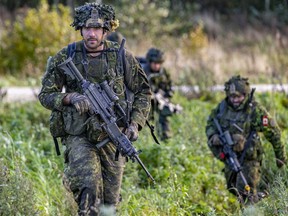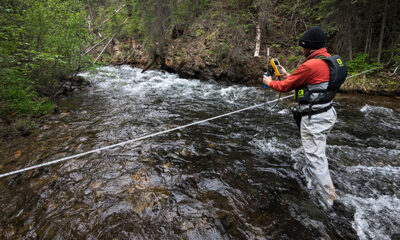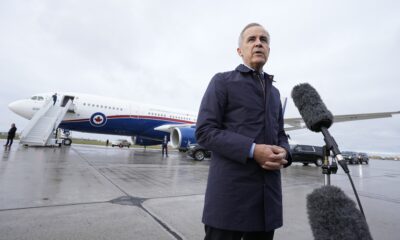Politics
Canada’s Military Faces Strain Amid Plans for Ukraine Deployment

Prime Minister Mark Carney has announced that Canadian troops may be deployed to Ukraine as part of a security force once a ceasefire is established. This potential move raises concerns about the current state of Canada’s military capabilities, particularly as it may require reallocating troops from Latvia, a decision that could jeopardize the security of that region.
The situation highlights significant challenges facing the Canadian military, which once maintained a robust presence in Europe. In 1964, Canada had approximately 11,000 soldiers and airmen stationed in Europe, along with peacekeepers in various locations worldwide. Today, questions arise regarding whether the current government can restore the military strength necessary to support multiple missions concurrently.
Critics point out that both Liberal and Conservative governments share responsibility for the diminished state of the military. In light of the proposed troop movements, citizens are questioning the feasibility of maintaining security commitments abroad while ensuring adequate defenses at home.
In a related note, concerns about municipal services surfaced in Ottawa. A letter-writer described a frustrating experience with the city’s 311 line, citing a two-hour wait to report an issue. Another resident, Robert A. MacDonald, shared his own difficulties after submitting a request regarding a traffic-calming bollard that had been displaced. Despite the simplicity of the request, MacDonald found himself waiting for over a week without action. Ultimately, he learned that his request had been misdirected, highlighting inefficiencies in municipal service responses.
Turning to national matters, discussions about a new official residence for the Prime Minister have gained traction. Justin Trudeau has not moved into 24 Sussex Drive, prompting inquiries about the feasibility of maintaining the aging property, which has been criticized for its poor condition, including rodent infestations and outdated infrastructure. A proposal to explore options for a new residence is reportedly in the works, with a timeline suggesting potential completion by January 2026.
Public sentiment regarding government spending continues to evolve. Aleyamma Samuel, a resident of Ottawa, expressed willingness to contribute to the costs of a new residence, emphasizing the need for responsible fiscal management.
Furthermore, Richard Eppich from Kanata suggested that political leaders should lead by example in efforts to reduce the national deficit. He proposed a 15 percent reduction in salaries and office budgets for Members of Parliament, arguing that such measures could lead to significant savings.
As Canada navigates these various challenges, the emphasis remains on restoring military capabilities while addressing pressing domestic issues, including inefficient municipal services and responsible government spending.
-

 World3 months ago
World3 months agoScientists Unearth Ancient Antarctic Ice to Unlock Climate Secrets
-

 Entertainment3 months ago
Entertainment3 months agoTrump and McCormick to Announce $70 Billion Energy Investments
-

 Lifestyle3 months ago
Lifestyle3 months agoTransLink Launches Food Truck Program to Boost Revenue in Vancouver
-

 Science3 months ago
Science3 months agoFour Astronauts Return to Earth After International Space Station Mission
-

 Technology2 months ago
Technology2 months agoApple Notes Enhances Functionality with Markdown Support in macOS 26
-

 Top Stories2 weeks ago
Top Stories2 weeks agoUrgent Update: Fatal Crash on Highway 99 Claims Life of Pitt Meadows Man
-

 Sports3 months ago
Sports3 months agoSearch Underway for Missing Hunter Amid Hokkaido Bear Emergency
-

 Politics3 months ago
Politics3 months agoUkrainian Tennis Star Elina Svitolina Faces Death Threats Online
-

 Technology3 months ago
Technology3 months agoFrosthaven Launches Early Access on July 31, 2025
-

 Politics3 months ago
Politics3 months agoCarney Engages First Nations Leaders at Development Law Summit
-

 Entertainment3 months ago
Entertainment3 months agoCalgary Theatre Troupe Revives Magic at Winnipeg Fringe Festival
-

 Politics2 weeks ago
Politics2 weeks agoShutdown Reflects Democratic Struggles Amid Economic Concerns




















